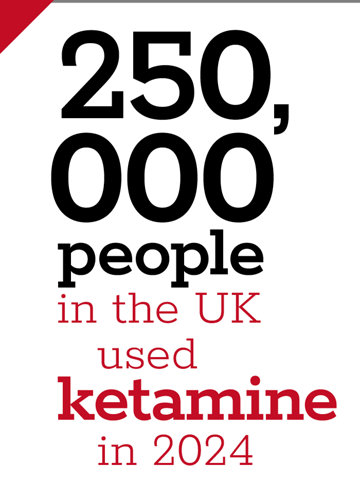Barney Casserly was just 21 when he took his own life in 2018 after enduring irreversible bladder damage from a three-year ketamine addiction. Amber Currah, a 27-year-old mother, needs a bladder transplant and lives with chronic pain and daily incontinence, despite quitting the drug nearly two years ago. And Finlay Worthington, 25, who counsels up to 150 addicts weekly in North West England, still passes blood in his urine and suffers from persistent bladder pain.
“I started peeing jelly.”
These stories are not isolated. They are emblematic of a burgeoning public health crisis, during which ketamine use in the UK has surged over the past decade, with usage among those under 25 tripling in that time.
Once considered a benign “party drug,” ketamine is now leaving a trail of devastation in its wake, prompting urgent calls for awareness, regulation and support.
Originally developed as an anesthetic for both humans and animals, ketamine found its way into the UK’s rave scene in the 1990s. Its hallucinogenic effects and dissociative properties made it a popular choice for partygoers seeking a temporary escape. However, its easy accessibility through social media platforms like Snapchat and Instagram and its low cost—often as little as £10 ($13.30) per gram—have contributed to its widespread use among young people.
According to the Office for National Statistics, 2.9 percent of youth aged 16 to 24 in England reported using ketamine in 2023–2024, up from 0.8 percent in 2012–2013. This demographic, now referred to by some as “Generation K,” is experiencing the drug’s most severe consequences.
“If we are offering major surgery to a person who’s 21, then the likelihood of having any sort of complications after that surgery [in the rest of their life]—it’s enormous,” Carolina Ochoa, a urologist, told the BBC in 2024 during the course of an ongoing nationwide ketamine addiction investigation undertaken by the news agency.
The outlook is equally grim for adult usage—a trend that has captured international attention since the 2023 death of Friends star Matthew Perry from the “acute effects of ketamine” in Los Angeles at the age of 54, following years of a highly public fight with substance abuse.
Figures from the UK government show the number of adults entering treatment with ketamine problems in Britain surged from 2,211 in 2022–2023 to 3,609 in 2023–2024.
A study by Exeter University found that 60 percent of regular ketamine users reported psychological issues, including anxiety, low mood and cravings. And according to the UK Statistics Authority, as many as 250,000 people took ketamine in 2023–2024.

One of the most alarming effects of chronic ketamine use is ketamine-induced cystitis, a condition that severely damages the bladder. Symptoms include intense pain, frequent urination and, in extreme cases, the need for bladder removal.
Catherine Carney, an addiction specialist, notes that some young patients experience such severe bladder shrinkage that they can only hold urine for minutes at a time, leading to a life dominated by pain and incontinence.
“In some cases, the bladder damage progresses to the kidneys and people get kidney failure, too,” Carney said, warning: “This is developing in people who have been using for two years, so it is relatively quick.”
Paige Collins, a 25-year-old former user, described her experience starkly: “I started peeing jelly,” she said, alluding to the fact that the lining of her bladder had been expelled. Despite treatments to stretch her bladder, the damage was irreversible, leaving her unable to work and dependent on frequent medical care.
Many users initially turn to the drug in an effort to escape their anxiety or depression, but the relief is temporary, and the ensuing addiction often exacerbates underlying problems.
Nick, a pseudonym for a user interviewed by The Guardian, recounted his descent into addiction: “It felt like my bladder just gave up on me.”
Even a trip to the supermarket proved to be an ordeal: “I’d go [down] one aisle then I’d have to go to the toilet,” Nick told the newspaper, adding: “It just destroys you completely.” In May 2024, Nick said he tried to take his life because “I thought I was beyond help. I gave up. I thought: I’m knackered. I’m done.”
Nick’s story underscores the insidious nature of ketamine addiction, where users often remain unaware of the drug’s dangers until significant damage has occurred.
The UK government is now seeking expert advice on whether to reclassify ketamine from a Class B substance—which currently makes it illegal to take, carry, make or sell the narcotic—to a Class A drug, which would impose a life sentence for manufacture and distribution. This move reflects growing concern over the drug’s impact on public health, especially among youth.
Healthcare providers are also responding. Specialized clinics are being established to treat ketamine-induced uropathy, and addiction support groups are expanding their reach. But experts emphasize that prevention through education is crucial. Rebecca Harding, for example, co-author of the Exeter University study, stresses the need for awareness campaigns to inform young people about the real risks of ketamine use.
Ketamine’s transformation from a party drug to a public health menace serves as a cautionary tale about the unintended consequences of recreational drug use. As Generation K grapples with the fallout, there is an urgent need for comprehensive strategies that combine regulation, education and support to address the growing crisis with the seriousness and compassion it demands.






















